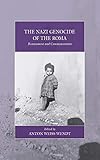The Nazi Genocide of the Roma : Reassessment and Commemoration / ed. by Anton Weiss-Wendt.
Material type: TextSeries: War and Genocide ; 17Publisher: New York ; Oxford : Berghahn Books, [2013]Copyright date: ©2013Description: 1 online resource (284 p.)Content type:
TextSeries: War and Genocide ; 17Publisher: New York ; Oxford : Berghahn Books, [2013]Copyright date: ©2013Description: 1 online resource (284 p.)Content type: - 9780857458421
- 9780857458438
- online - DeGruyter
| Item type | Current library | Call number | URL | Status | Notes | Barcode | |
|---|---|---|---|---|---|---|---|
 eBook
eBook
|
Biblioteca "Angelicum" Pont. Univ. S.Tommaso d'Aquino Nuvola online | online - DeGruyter (Browse shelf(Opens below)) | Online access | Not for loan (Accesso limitato) | Accesso per gli utenti autorizzati / Access for authorized users | (dgr)9780857458438 |
Frontmatter -- CONTENTS -- Acknowledgments -- Introduction -- Chapter 1 Assimilation and Persecution: An Overview of Attitudes toward Gypsies in France -- Chapter 2 Genocidal Trajectory: Persecution of Gypsies in Austria, 1938–1945 -- Chapter 3 Ustaša Mass Violence Against Gypsies in Croatia, 1941–1942 -- Chapter 4 Ethnic Cleansing or “Crime Prevention”? Deportation of Romanian Roma -- Chapter 5 Nazi Occupation Policies and the Mass Murder of the Roma in Ukraine -- Chapter 6 The Nazi Persecution of Roma in Northwestern Russia: The Operational Area of the Army Group North, 1941–1944 -- Chapter 7 The Justice System of the Federal Republic of Germany and the Nazi Persecution of the Gypsies -- Chapter 8 Disentangling the Hierarchy of Victimhood: Commemorating Sinti and Roma and Jews in Germany’s National Narrative -- Chapter 9 The Aftermath of the Roma Genocide: From Implicit Memories to Commemoration -- Selected Bibliography -- Notes on Contributors -- Index
restricted access online access with authorization star
http://purl.org/coar/access_right/c_16ec
Using the framework of genocide, this volume analyzes the patterns of persecution of the Roma in Nazi-dominated Europe. Detailed case studies of France, Austria, Romania, Croatia, Ukraine, and Russia generate a critical mass of evidence that indicates criminal intent on the part of the Nazi regime to destroy the Roma as a distinct group. Other chapters examine the failure of the West German State to deliver justice, the Romani collective memory of the genocide, and the current political and historical debates. As this revealing volume shows, however inconsistent or geographically limited, over time, the mass murder acquired a systematic character and came to include ever larger segments of the Romani population regardless of the social status of individual members of the community.
Mode of access: Internet via World Wide Web.
In English.
Description based on online resource; title from PDF title page (publisher's Web site, viewed 25. Jun 2024)


